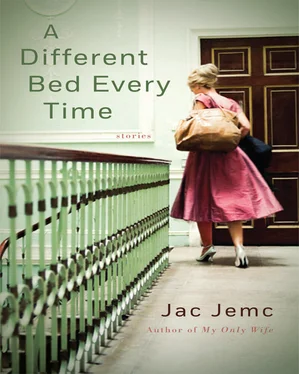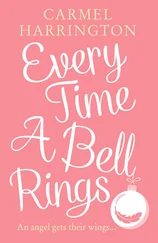Jac Jemc - A Different Bed Every Time
Здесь есть возможность читать онлайн «Jac Jemc - A Different Bed Every Time» весь текст электронной книги совершенно бесплатно (целиком полную версию без сокращений). В некоторых случаях можно слушать аудио, скачать через торрент в формате fb2 и присутствует краткое содержание. Год выпуска: 2014, ISBN: 2014, Издательство: Dzanc Books, Жанр: Современная проза, на английском языке. Описание произведения, (предисловие) а так же отзывы посетителей доступны на портале библиотеки ЛибКат.
- Название:A Different Bed Every Time
- Автор:
- Издательство:Dzanc Books
- Жанр:
- Год:2014
- ISBN:9781941531808
- Рейтинг книги:3 / 5. Голосов: 1
-
Избранное:Добавить в избранное
- Отзывы:
-
Ваша оценка:
- 60
- 1
- 2
- 3
- 4
- 5
A Different Bed Every Time: краткое содержание, описание и аннотация
Предлагаем к чтению аннотацию, описание, краткое содержание или предисловие (зависит от того, что написал сам автор книги «A Different Bed Every Time»). Если вы не нашли необходимую информацию о книге — напишите в комментариях, мы постараемся отыскать её.
is a brilliant, haunting, and heartbreaking debut that explores themes of loss and love." — A thief steals the air from a room. Children invent a nursery rhyme to make sense of their fate. A band of girls rot from the outside in. These characters stumble through joy and murder and confusion, only to survive and wait for the next catastrophe to arrive. Moments so brief and disturbing you can't afford to look away. Jac Jemc's affecting stories mine the territory between what is real and the stories we tell to create understanding.
A Different Bed Every Time — читать онлайн бесплатно полную книгу (весь текст) целиком
Ниже представлен текст книги, разбитый по страницам. Система сохранения места последней прочитанной страницы, позволяет с удобством читать онлайн бесплатно книгу «A Different Bed Every Time», без необходимости каждый раз заново искать на чём Вы остановились. Поставьте закладку, и сможете в любой момент перейти на страницу, на которой закончили чтение.
Интервал:
Закладка:
I was still sleeping when Coot pulled into a roadside motel in Albuquerque. I heard the gravel of the lot locating itself beneath the car, and my voice caught. “Where is this?” I asked, and Coot said, “This is where we part.” I climbed out of the car and walked toward the office. He called after me that I’d forgotten my bag. I’d thought he would at least wait for me to be sure I could get a room, but I was meek, and I pulled open that sticky back passenger door and grabbed my belongings. As the door to the office tinkled open, I heard his tires squeal back onto the road.
That afternoon I wrote Wader to let him know I was safe in Albuquerque. I signed the letter “Love, Jovey” because that’s what I felt at the time. When I returned to Chicago everything would be muddier, but that sign-off felt clear and true that morning.
I’ve made a lot of mistakes, and mostly, I’ve been able to recognize them as such. That drive, though, something was wrong, and I’ve never been able to figure it out. There’s an old Hitch-cock movie where all of the violence happens behind a curtain. A man pulls a woman behind heavy velvet and tries to rape her. The camera shows her hand fumble out grasping for anything to defend herself, until her fingers land on a knife left out on a cheese board, and that, too, disappears behind the curtain. And then, the lumpy, unseen struggle subsides, and you see a male hand flop out, over the arm of a chair, and the terrified heroine emerges, wondering how what just happened could have happened. All that confusion and she was the only one to survive to tell the story. No one could make it clearer for her. She had all the answers there could be.
Filch and Rot
We started out as petty thieves, picking up the mulch-worthy crabapples from neighbors’ lawns. We poured water into the vodka bottles in the basement. We took swipes of our brothers’ deodorant to cover up our sour smells because it had a better scent than anything the pharmacy had to offer us young ladies.
We fished the tubes of lipstick out of our teachers’ purses. They all wore the same brand: CoverGirl TruShine. In a town with so few options, why were they ignoring the other brands in the drugstore aisle? Surely some teacher with some popularity had spread the word that TruShine was the best product and all of the other teachers had trucked over to the Walgreens or the CVS to smear samples on the thumb edge of their hands.
While our parents watched movies or failed to listen to each other in arguments, we tucked out the back doors. We set up shell games on the street with the lipstick. We’d uncap the tubes and spin out the shades.
Mrs. Ball wore muted Powderpink Shine and applied hers until the waxy stick ended in a flat plateau. Mrs. Pullman wore Blushberry Shine and rounded off the tip of her tube. Finally we flashed Ms. Withers’ whorey, bright crimson Valentine Shine with the perfectly maintained diagonal. Cosmo had told us this shape of lipstick proved that Ms. Withers was the moody, daring role model we all hoped she was, riding around town with the young shop teacher, his hands rough and smelling of oil, his eyes full of promises and splinters.
We’d cap the tubes and lay them down on our piece of cardboard outside the Circle K. Our hands would move fast, sliding the tubes around each other. “Powderpink Blushberry Valentine!” we’d call like we were conjuring something. Cash had been laid down. How our parents never heard about the con girls shuffling lipstick outside the Circle K, we didn’t know, and thanked the Good Lord above out loud, but in each of our minds we thought, “Someday they’ll hear and they’ll need to confront us, and would that be so bad?”
We were fast with our hands. We’d rotate in Rosy Shine and Mauve Shine that looked so much like Powderpink Shine. We’d shake our heads sadly when the mark picked the wrong shade every time. “Just tell me how you do it,” Bobby’s father asked us, but we knew if we didn’t tell him that he’d come back with a theory, empty his wallet again.
It wasn’t long before we started picking up other people’s orders at the fast-food chain. One of us would order a soft drink and we’d sit with our backs turned to the people line. We’d wait to watch a harried mother pass us to settle her children in before the food was up, and when that number was called and the mother was still pulling off her children’s coats and digging up one more booster seat, three of us would file out. One would go smile sweetly at the young pimpled boy who went to school in the next town over and wrap her neatly manicured fingers slowly around the top of the bag, and say, in a voice so breathy it would blow through the boy’s twitchy dreams, “Thank you,” and meet us outside where we’d walk to the forest preserve and eat the bits of chicken and plain hamburgers ordered for the kids and the fish fillet sandwich the mother had fooled herself into thinking was a favor to her health.
We had been the smart girls, but we’d started getting pretty and thievish. We used our smarts to find workarounds instead. If we only had time to write two pages of a five-page research paper, we printed out the pages we had and then stapled them to three blank pages, and ripped those pages off, leaving a jagged triangle of paper where no more research had been. We’d slide this paper into the middle of the pile, and by the next day or the next week when the teacher had sorted through the papers, she would have to tell us she was so sorry, but it appeared some of the pages of our reports had been lost, could we please reprint them and turn them in ASAP, and we said we’d bring them the next day.
Shanna kept saying, “So we bought some time. What’s the big deal?”
“Stole. Stole that time,” I reminded her.
We started cutting class and trolling other neighborhoods, watching people’s routines. We noticed people loading their cars with suitcases. We counted family members leaving the house. We had a pattern down. Janna checked all the windows. Eve checked all the doors. Cathy looked for spare keys, and I sat out front ready to call out if I saw something suspicious. We never went in without an escape route, an alley or some woods behind the house that we could disappear in.
We took TVs until we had enough of those. We took jewelry and movies we wanted to see and bottles of liquor and stuffed animals that stared at us saying, “Take me with you!” We could have taken a lot more with the intention of selling it, but we behaved modestly. Most of all, it was the thrill we were stealing.
We rubbed dirt into the hems of our skirts and dusted our sandaled feet until they were an ashy gray. At home we exclaimed our wonder at what people would throw away or drop off at the dump. Our fathers smiled at the new TV, but our mothers knew that any self-respecting proprietor of the trash heap would have kept that TV for himself. “Eleanor, you can’t keep a stuffed bunny from the dump. You’ll get red fever or cholera.” She pronounced “cholera” with a “ch,” and when we heard that noise our minds felt vindicated. We’d shrug and hug the animal tight, then place it in the arms of our little sister, and she’d run off thrilled and our mother would give us a look like, “You’ve just murdered your sister. Hope you’re happy.” And we were. Not because we were killing our sisters but because we knew how our mother was failing.
In the winter, we’d plan. The snow slowed us down. We had big downy coats to hide our bounty in, but we hadn’t figured out how to avoid leaving footprints around the houses. We barreled around each other’s rooms, sifting through the jewels we’d purloined, letting loose an expensive kind of laughter. Our mothers would knock on our doors, convinced we were getting high. When no smells shaped the right way they’d walk around the outside of the house looking for our windows to be open, for toilet paper tubes with dryer sheets to be aimed out into the winter air, but they were always shut tight. We saw our mothers in the side yards making tracks of their own and we waved enthusiastically, the wide expanses of our faces undamaged by fear of being caught. Our mothers inhaled sharply, their nostrils stamped together by the freezing wind, their khakis wet to the knee from not having bothered to put boots on instead of house sneakers. When our friends left, our mothers would ask to talk to us. “Are you involved in hate and destruction?” they’d ask. They’d comment on the asymmetry of the family as we grew and distanced ourselves. They began worrying and we all felt moments of sympathy for them, but we shook our heads just the same. “Is this what it is to watch your daughter grow?” they asked themselves as we walked away from the table. We shaped our fingers into guns as we rounded the corner and shot at our heads.
Читать дальшеИнтервал:
Закладка:
Похожие книги на «A Different Bed Every Time»
Представляем Вашему вниманию похожие книги на «A Different Bed Every Time» списком для выбора. Мы отобрали схожую по названию и смыслу литературу в надежде предоставить читателям больше вариантов отыскать новые, интересные, ещё непрочитанные произведения.
Обсуждение, отзывы о книге «A Different Bed Every Time» и просто собственные мнения читателей. Оставьте ваши комментарии, напишите, что Вы думаете о произведении, его смысле или главных героях. Укажите что конкретно понравилось, а что нет, и почему Вы так считаете.












